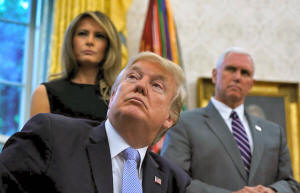|
Trump's Houston trip will serve as
empathy test
 Send a link to a friend
Send a link to a friend
 [September 02, 2017]
By James Oliphant [September 02, 2017]
By James Oliphant
WASHINGTON (Reuters) - For a man who
prefers to project a glowering brusqueness, Donald Trump's trip to
Houston on Saturday provides him with the opportunity to show a warmer,
more empathetic side — and perhaps connect with some Americans critical
of his presidency.
Trump's predecessor, Barack Obama, became known as the
"comforter-in-chief" for his role in consoling victims of mass shootings
and terror attacks. But the flooding caused by Hurricane Harvey marks
the first large-scale national tragedy under Trump's watch.
The White House said Trump will first travel to Houston to meet with
flood survivors and volunteers who assisted in relief efforts and then
will move on to Lake Charles, Louisiana, another area hammered by the
storm.
Trump first visited the region on Tuesday, but stayed clear of the
disaster zone, saying he did not want to hamper rescue efforts. Instead,
he met with cabinet members, state and local leaders, and first
responders.
He was criticized, however, for not meeting with victims of the worst
storm to hit Texas in 50 years, and for largely focusing on the
logistics of the government response rather than the suffering of
residents.
"That was reasonable criticism," said Matt Mackowiak, chairman of the
Republican Party in Travis County, Texas, who has praised the Trump
administration’s handling of the disaster.

More than 1 million people have been displaced by Harvey and up to 50
are feared dead in flooding that paralyzed Houston and swelled river
levels to record highs.
Saturday’s trip gives Trump a second chance, one Mackowiak said he
should take full advantage of.
"It's useful for the president of the United States to have an emotional
connection with the country," he said, adding that it could be "valuable
for the half of the country that opposes him right now."
According to the Reuters/Ipsos tracking poll, almost 59 percent of the
public disapproves of Trump’s performance as president.
NO TIME FOR TEARS
While Obama famously shed tears after the 2012 shootings at Sandy Hook
Elementary in Newtown, Connecticut that left 20 children dead, Trump has
rarely displayed emotion other than anger at his critics and the news
media.
One exception was the chemical attack in April by Syria's government
that killed more than 70 people, many of them children.
“When you kill innocent children, innocent babies, babies, little
babies, with a chemical gas that is so lethal,” Trump said at a press
conference after the attack. “That crosses many, many lines.”
As a presidential candidate, Trump was lauded by the families of people
killed by undocumented immigrants, who said he personally expressed his
sympathy for their loss.
[to top of second column] |

U.S. first lady Melania Trump, Vice President Mike Pence and U.S.
President Donald Trump receive an update on Hurricane Harvey
recovery efforts at the White House in Washington, U.S., September
1, 2017. REUTERS/Kevin Lamarque

But he was widely rebuked for his response to last month’s violence
in Charlottesville, Virginia when he appeared to be more interested
in apportioning blame and feuding with his detractors than soothing
the nerves of a rattled nation.
Trump of course first made his name as a real-estate mogul in
Manhattan, branding himself as an expert in steel-eyed negotiation,
and then cemented that image with his popular reality TV show, in
which he coldly fired contestants unable to measure up.
As a presidential candidate, he frequently exhorted the value of
“toughness” and praised business executives who were “killers.”
“My sense, based on his life and career, is that he’s not a publicly
sympathetic or empathetic individual,” Mackowiak said.
Tony Perkins, a pastor and president of the Family Research Council,
a conservative advocacy group, said there is a warmer side to Trump.
Perkins accompanied Trump when, as a candidate, he visited with
flood victims in rural Louisiana last year.
Trump, along with now-Vice President Mike Pence, toured the
devastation, handing out bottles of water and diapers.
Perkins said Trump would repeatedly order his caravan to stop so he
could talk to survivors. “I saw a very compassionate side to him ...
He was visibly impacted by what he saw.”
Gerard Landry, the mayor of Denham Springs, Louisiana, a city of
10,000 which saw almost 80 percent of its buildings damaged by the
flood, met with Trump at the town high school.
“He shook my hand, grabbed me by the shoulder,” Landry said. “He
said, ‘Mr. Mayor, your city is going to come back, and I know you’ll
be fine. I know you can do this thing.’”

Landry had been expecting the boisterous Trump of his campaign
rallies, but found him to be "totally different, down to earth."
Saturday’s trip, Perkins said, affords Trump a moment to show the
nation that side of him. “It’s genuine,” Perkins said. “It’s real.”
(Editing by Kieran Murray and Mary Milliken)
[© 2017 Thomson Reuters. All rights
reserved.]
Copyright 2017 Reuters. All rights reserved. This material may not be published,
broadcast, rewritten or redistributed. |